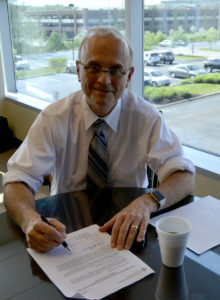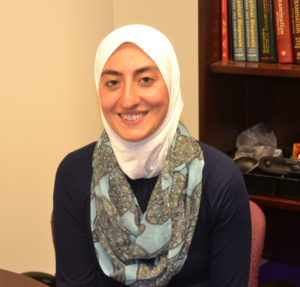Chapter 7 – Religion and Spirituality
7.1 Understanding Religion and Spirituality Bias
Camilla Curren MD
Religious Beliefs in Modern Medicine

“There is a God-shaped vacuum in the heart of every man”, is one of Dr. Mike Miller’s favorite quotes. These words by the philosopher Blaise Pascal were intended to amplify upon a universal need to believe in a deity or higher power. However, this belief system, according to Miller, the Chief of Plastic Surgery at The Ohio State University Wexner Medical Center (OSUWMC), has fallen out of favor in modern society and now, according to the words of a medical student and patient at OSU, persons with a religious belief system feel they need to “explain to others or to justify how being a person of faith is compatible with being an intelligent individual.” This documented increase in secular versus religious beliefs in our society1 persists despite demonstrated health benefits, particularly in the reduction of the anxiety and depression associated with a plethora of complex health problems, statistically associated with faith and spirituality.2
Bias and Differing Belief Systems

Lana Alghothani, MD, a pulmonary/ critical care fellow at OSUWMC who wears a hijab, notes that female medical students are often surprised that she can relate to them and to their concerns– likely due to her obvious religious affiliation. However, she does not feel that she has really been the victim of interprofessional bias in her time at OSU due to being a Muslim-American. (Nationally, 25% of Muslim physicians of diverse national origin feel they have faced bias or workplace discrimination by peers.2) She does note instances in which patients have treated her differently than they have treated her physician associates. Miller, on the other hand, believes that he was marginalized and his learning given less priority during his residency some years ago since he did not react well to coarse jokes and swearing on rounds; he believes his stated beliefs as a “spiritual person” (Miller is a Protestant who describes his personal philosophy as “metaphysical realism”) likely cost him some residency spots. And as recently as 2 years ago, a Catholic medical student at OSU reports being criticized by residents on her team for her discomfort in writing for oral contraceptive medications. She also notes that she has seen Catholic patients repeatedly advised to have tubal ligations or to start oral contraceptives despite their stated discomfort with these measures and without physician inquiry as to the reasons for their decision-making.4 This has caused her to perceive a bias toward Catholics that has made her determined to avoid revealing her religious beliefs (she remains anonymous for this publication) since she feels that others will view her as frivolous or as less intelligent and hardworking than she truly is, whether in the physician or the patient role. According to the Pew Research Center on Religion and Public Life, most Americans of Jewish descent do not believe they are discriminated against in healthcare settings, especially compared to Muslims, blacks, and LGBT persons whom they feel face more discrimination; however, 15% of the Jewish citizens surveyed noted being snubbed or called an offensive name in the last year as a form of cultural discrimination.5 And patients who adhere to religious faiths not well represented in a geographic area, like Hindu or Buddhist patients in Ohio, may experience discomfort in medical settings since their customs and behaviors surrounding illness are poorly understood by medical personnel and subsequently ignored.8
Origins of Religious Bias in Medicine
Miller believes that the lack of philosophy as a common educational requirement has made it harder for all US citizens, whether in the role of physicians or of patients, to understand the roots of religious bias, as well as of bias in general, and has created additional difficulties in overcoming it. “Students do not understand the philosophical nature of reality and of knowledge”, he believes, and so do not have a background in reality testing and transcendent principles that would allow them to critically think about religion, or to understand and accept those who do not agree with them regarding any aspect of existence. He believes that, in overcoming bias in medicine, it is critical to identify and to examine what characteristics of a person are influencing how one deals with that individual. Everyone has bias, but it is important to sort appropriate from inappropriate distinctions (for example, it is advantageous and appropriate to be biased against persons trying to do you active harm, and this type of bias is likely based on evolutionary principles; however, having bias against everyone with the same hair color as the harm-doer would constitute maladaptive and inappropriate bias). This type of bias testing, Miller believes, would function productively in the best interest of human relationships and particularly of patient care; he feels this type of bias testing would help with reducing religious discrimination.
Ameliorating Religious Bias and Discrimination in Medicine
In his personal dealings with patients, Miller finds that acceptance helps overcome bias, and keeping foremost the concept that every person has value helps with this acceptance. Miller believes that every person was made with a purpose by God; this concept helps him to think more objectively about people and to assist him in helping families deal with difficult problems and interactions at work as well as to deal constructively with colleagues. And studies have in fact verified the links between a spiritual nature or having faith, humility, and positive interactions with others and have positively correlated these traits with lower degrees of burnout, and with better medical outcomes in chronic illness.3,6
Similarly Alghothani notes that the conscious acts of realizing that people are more nuanced and complex than we initially believe they are, and of being willing to engage in discussion and provide on-the-spot education about religious and cultural differences, goes a long way toward neutralizing the effects of bias toward patients and healthcare providers of different faiths and ethnicities. For instance, when a patient told Alghothani (who was reared in Upper Arlington, a suburb of Columbus, OH) that she was “ the first brown person I saw who spoke English fluently” or when a patient asked her about her affiliation with ISIS, she recognized these as good opportunities to bring up bias, acknowledge it, and educate around it with the patient and family. She hopes that, in time, broader cultural education will reduce bias overall, but until that time comes, she feels that avoiding generalizations about different religious and cultural groups will go far toward preventing misunderstandings. Currently, accessing available literature on cultural and religious beliefs of patients, as well as asking questions of the patient when understanding is lacking, may avoid discomfort and biased behaviors on medical teams.8
As an example of bias, Alghothani points out her encounter with a large family of ethnic descent whose behavior seemed troublesome and irrational to the ICU staff; staff blamed family religious beliefs for the disconnect. Further investigation, however, revealed that a combination of financial constraints and illness among other family members played into the difficulties and that religion was not a factor at all.
While we cannot eliminate bias we do need to be cognizant of it and work to negate its effects, our interviewees agree. For instance, addressing ridicule directly or through reporting channels , and avoiding offhand disrespectful remarks referential to distinct groups, as well as educating on-the-spot as Alghothani recommends, will help physicians to learn to be more respectful about others’ convictions and to be positive in their relationships with peers and patients. And it is also important to note that many physicians, who espouse secular beliefs, actually behave in a spiritual fashion and hold some religious beliefs, most often acted upon by psychiatrists when dealing with patients.7